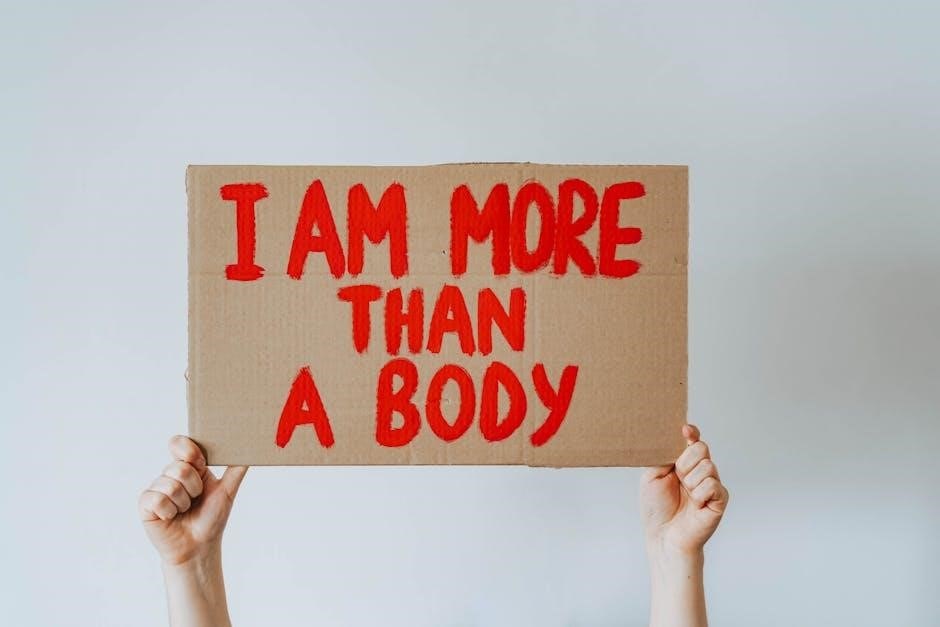
Self-worth is the recognition of your inherent value as a person, influencing thoughts, feelings, and behaviors. It is crucial for mental well-being and personal growth.
1.1 Defining Self-Worth
Self-worth refers to the inherent value and respect individuals hold for themselves, regardless of external achievements or circumstances. It is the unconditional belief in one’s dignity and worthiness, separate from self-esteem, which often fluctuates based on actions or outcomes. Recognizing self-worth fosters resilience, confidence, and a positive mindset, enabling individuals to embrace their strengths and address self-doubt effectively.
1.2 The Role of Self-Worth in Mental Health
Self-worth significantly impacts mental health by influencing self-perception and emotional resilience. Low self-worth can lead to self-doubt, anxiety, and depression, while healthy self-worth fosters positivity and confidence. Worksheets and exercises help individuals identify strengths, challenge negative beliefs, and cultivate self-compassion, thereby promoting mental well-being and emotional stability. These tools are essential for building resilience and improving overall mental health outcomes.

Benefits of Using Self-Worth Worksheets
Self-worth worksheets help individuals recognize strengths, build confidence, and foster self-awareness. They promote reflection, positivity, and self-compassion, serving as powerful tools for personal growth and emotional well-being.
2.1 How Worksheets Promote Self-Reflection
Self-worth worksheets provide a structured format for individuals to explore their thoughts and emotions deeply. By guiding users through specific exercises, such as identifying strengths and achievements, these tools foster a greater understanding of personal values and qualities. This reflective process helps individuals recognize their positive traits and cultivate a more compassionate and positive mindset, leading to clearer insights into their self-worth and personal growth.
2.2 Practical Tools for Building Confidence
Self-worth worksheets offer actionable exercises that help individuals identify and challenge negative self-perceptions. Tools like strength-spotlighting and gratitude journaling provide clear steps to enhance self-confidence. These structured activities encourage users to focus on their achievements and positive qualities, fostering a mindset that supports personal growth and resilience. By practicing these exercises regularly, individuals can build a stronger sense of self-assurance and self-worth.

Types of Self-Worth Worksheets Available
Self-worth worksheets cater to various age groups and needs, including kids, teens, and adults, offering activities tailored to recognize strengths, build confidence, and foster self-awareness.
3.1 Worksheets for Kids
Self-worth worksheets for kids are designed to help them recognize their strengths and build confidence. These age-appropriate activities include exercises that expand vocabulary, foster self-expression, and promote positive self-image. Many worksheets incorporate engaging elements like drawing and writing prompts, making them fun and accessible for young children. Parents and educators can use these tools to encourage early development of self-awareness and resilience.
3.2 Worksheets for Teens
Worksheets for teens focus on helping them identify strengths, reflect on achievements, and cultivate self-worth. Tools like the Strengths Spotlight Worksheet encourage teens to acknowledge their skills and build confidence. These resources also include exercises on self-compassion and gratitude, fostering resilience and a positive self-image. Designed for personal growth, they provide engaging prompts tailored to adolescent needs, helping teens navigate identity and self-awareness effectively.
3.3 Worksheets for Adults
Worksheets for adults provide structured exercises to enhance self-awareness and self-worth. They often include prompts for reflecting on personal values, strengths, and life goals. Tools like self-compassion exercises and gratitude journals help adults foster resilience and positivity. These resources cater to personal growth, offering practical methods to challenge negative thought patterns and develop a healthier, more compassionate relationship with oneself throughout life.

Gratitude Exercises for Self-Worth

Gratitude exercises help recognize life’s positives, fostering a positive mindset and enhancing self-worth. They involve practices like journaling to reflect on daily blessings, promoting emotional well-being.

4.1 Gratitude Journaling
Gratitude journaling is a powerful tool for fostering self-worth by focusing on life’s positive aspects. It involves writing down things you’re thankful for, reflecting on their significance, and acknowledging how they positively impact your life. This practice helps cultivate a positive mindset, appreciate daily blessings, and recognize personal strengths, ultimately enhancing overall self-worth and emotional well-being through consistent reflection and appreciation.
4.2 Positive Qualities Record
A Positive Qualities Record helps individuals identify and celebrate their personal strengths, skills, and achievements. By documenting these attributes, one gains clarity on their value, fostering self-worth. This exercise encourages self-reflection and recognition of personal accomplishments, reinforcing a positive self-image and confidence. Regularly updating this record can lead to a greater appreciation of oneself and a more resilient mindset, enhancing overall mental well-being and self-perception.
Engage in targeted exercises to enhance self-worth, such as identifying strengths and practicing self-compassion. These activities help cultivate confidence and foster a positive self-image. The Strengths Spotlight Worksheet encourages individuals to identify and reflect on their personal strengths, skills, and achievements. By focusing on positive attributes, participants can build confidence and develop a more positive self-image. This exercise helps individuals recognize their capabilities, fostering self-worth and resilience. It is particularly effective for teens, aiding them in cultivating a strong sense of self-value and personal confidence. Self-compassion exercises are designed to help individuals cultivate kindness and understanding toward themselves, especially during challenging times. These exercises promote a nurturing relationship with oneself, fostering emotional resilience and self-worth. By practicing self-compassion, individuals can learn to acknowledge their imperfections without judgment and develop a more positive self-image. These exercises are often included in self-worth worksheets and are available as free PDF downloads for easy access and practice. Self-care and journaling activities help individuals nurture their well-being and reflect on personal growth. These exercises, often found in self-worth worksheets, promote resilience and mindfulness. A self-care planning worksheet guides individuals in identifying and scheduling activities that nurture their physical, emotional, and mental well-being. It encourages reflection on personal needs and priorities, helping to create a balanced routine. These tools often include sections for goal setting, gratitude practices, and mindfulness exercises, fostering a deeper connection to oneself and promoting long-term self-worth. Regular use enhances resilience and self-compassion. Reflective journaling prompts are designed to deepen self-awareness and self-acceptance, helping individuals explore their thoughts, emotions, and experiences. These prompts often focus on identifying strengths, acknowledging achievements, and practicing gratitude. By regularly engaging with these exercises, individuals can cultivate a positive self-image and foster personal growth, which is essential for building and maintaining healthy self-worth over time. This practice is both therapeutic and transformative. Educators and professionals can access printable worksheets, workbooks, and activities designed to help individuals build self-worth. These resources include guided exercises and tools for group sessions. Printable worksheets are excellent tools for group activities, fostering collaboration and self-reflection. They include icebreakers, collaborative exercises, and guided discussions to promote shared growth. These resources help educators and professionals create engaging sessions focused on building self-worth, encouraging participation, and developing a supportive environment. They are designed for diverse age groups and can be adapted to various settings, making them versatile for both educational and therapeutic use. Workbooks tailored for young people offer structured exercises to explore self-worth, addressing challenges like low confidence and self-doubt. Designed for kids and teens, these resources include activities on gratitude, strength identification, and self-care. Clinicians and educators often recommend them as effective tools for fostering resilience and positive self-perception, helping young individuals navigate emotional and social development with confidence and self-awareness. Download free self-worth worksheets and PDFs designed to boost self-esteem, featuring exercises on gratitude, strengths, and self-compassion. These tools are ideal for personal growth and self-reflection.
These downloadable tools include self-esteem building exercises, such as strength spotlights and gratitude journals, designed to help individuals recognize and enhance their positive qualities. PDFs are available for kids, teens, and adults, offering structured activities to foster self-reflection and personal growth. Printable worksheets provide engaging resources for educators and professionals to support their clients or students in developing a healthier self-image and confidence. These exercises focus on cultivating kindness and understanding toward oneself, enhancing self-worth. Available as free PDF downloads, they include guided prompts and reflections to help individuals develop a nurturing relationship with themselves. Designed for all ages, these tools encourage mindfulness, self-acceptance, and emotional resilience, providing a compassionate approach to building confidence and fostering a positive self-image. Self-worth worksheets empower individuals to recognize their value, fostering confidence and resilience. By embracing these tools, one can cultivate a positive self-image and embrace personal growth; Self-worth worksheets profoundly enhance personal development by fostering self-awareness, confidence, and resilience. They provide structured tools for individuals to identify strengths, practice gratitude, and cultivate self-compassion. By consistently using these resources, users can develop a healthier self-image, leading to improved mental well-being and a more positive outlook on life. These worksheets are invaluable for long-term personal growth and emotional stability. Embracing self-worth worksheets is a powerful step toward personal growth. These tools offer guidance to help you recognize your value, build confidence, and cultivate resilience. Starting your journey may feel daunting, but the rewards of improved mental well-being and self-awareness are transformative. Take the first step today—download a worksheet and begin nurturing a positive, compassionate relationship with yourself. Your growth is worth it.
Building Self-Worth Through Specific Exercises
5.1 Strengths Spotlight Worksheet
5.2 Self-Compassion Exercises
Self-Care and Journaling Activities
6.1 Self-Care Planning Worksheet

6.2 Reflective Journaling Prompts
Resources for Educators and Mental Health Professionals
7.1 Printable Worksheets for Group Activities
7.2 Workbooks for Young People

Free Self-Worth Worksheets and PDFs
8.1 Downloadable Self-Esteem Building Tools
8.2 Free Self-Compassion Exercises
9.1 The Impact of Self-Worth Worksheets
9.2 Encouragement to Start the Journey